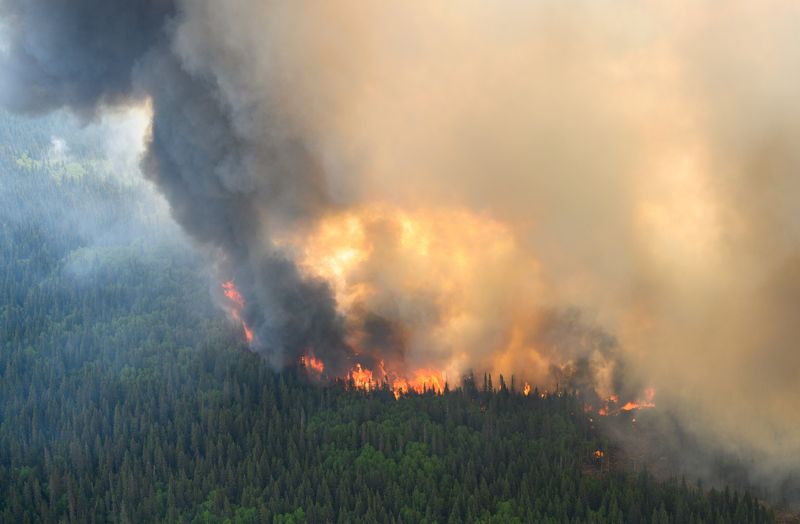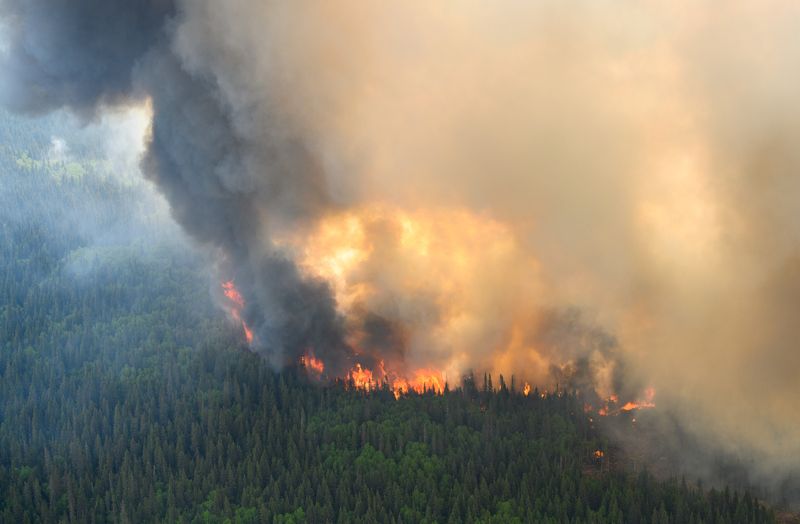
© Reuters. FILE PHOTO: Flames rise along the edge of a wildfire as seen from a Canadian Forces helicopter surveying the area near Mistissini, Quebec, Canada, June 12, 2023. Cpl Marc-Andre Leclerc/ Canadian Forces/Handout via REUTERS/File Photo
By Nia Williams
BRITISH COLUMBIA (Reuters) – Canada is dealing with the worst start to the wildfire season, but recruiting firefighters is becoming increasingly difficult due to tight job markets and the tough nature of the job, provincial officials say.
Limited resources could threaten Canada’s ability to put out the fires, which are expected to grow larger and more ferocious in the future as a result of fossil fuel-driven climate change, potentially causing further damage to communities and disrupting operations. oil and gas, mining and lumber industries of the country.
A Reuters survey of the 13 provinces and territories showed that Canada employs about 5,500 wildland firefighters, not including the remote Yukon Territory, which did not respond to requests for information.
That’s about 2,500 firefighters short of what’s needed, said Mike Flannigan, a professor at Thompson Rivers University in British Columbia and a specialist in wildfires.
“It’s hard work, it’s hot work, it’s steamy work, and there are real issues with long-term health impacts,” Flannigan said. “It’s getting harder and harder to recruit and retain people.”
This year, Ontario extended its application period, boosted marketing efforts and began covering training costs to secure more recruits. Applications dropped in British Columbia and Nova Scotia, and Alberta had to go through several rounds of recruitment to fill its ranks, officials said.
Canada’s provinces and territories share crews and equipment as needed and turn to international and military partners in times of dire need. But this year unprecedented fires broke out simultaneously in the east and west, causing competition for firefighters and planes.
“This was the worst-case scenario that everyone fears: multiple areas of the country burning at the same time,” said Scott Tingley, Nova Scotia’s manager of forest protection.
Wildland fire crews work 12-14 hour days, up to two weeks at a time, in high-stress, smoke-filled environments, often in remote wilderness areas.
Seasonal work, longer fire seasons and the uncompetitive base wage, which ranges from C$30 an hour in British Columbia to C$18 an hour in Manitoba, also deter people.
“We compete with many other job markets. It’s physically demanding and mentally exhausting work,” said Rob Schweitzer, CEO of BC Wildfire Service.
A week of cooler weather and rain eased some fires in Canada, but 6.5 million hectares (16 million acres), an area the size of Lithuania, have already burned this year and unusually warm weather is expected to return. .
FILLING THE GAPS
Record fires this year resulted in Canada deploying around 550 members of the armed forces and more than 1,700 international firefighters, paid by the provinces, to bolster their crews. As more wildfires threaten communities, provincial agencies are also increasingly relying on structural firefighters to help protect homes.
But of the 126,000 structural firefighters in Canada, 90,000 are volunteers, according to the Canadian Association of Fire Chiefs, who are bearing the pressure to protect their own communities while holding down day jobs.
At the height of the fires in May and June, some provinces called for additional recruits for wildfires. Alberta deployed 157 people responding to a government call, Nova Scotia sent its first team of 30-person volunteers last week and Quebec trained an additional 300 volunteers and forest workers who are not usually part of its wildfire service.
Additional labor is not cheap. Annual national wildfire protection costs have exceeded C$1 billion for six of the past 10 years, according to federal government data, and have increased by about C$150 million per decade since 1970.
Most experts expect them to keep climbing.
The federal government is spending C$38 million to recruit, train and retain firefighters and C$256 million over five years on an equipment fund and working on a structural firefighter training pilot project. A spokesman for the Ministry of Emergency Preparedness said the government recognizes the need for further investment.
“The men and women fighting the bushfires are doing a great job, but the fact is there aren’t enough of them,” said Ken McMullen, president of the Canadian Association of Fire Chiefs.
(This story has been corrected to set the Manitoba wage rate at C$18 per hour, not C$0.74 per hour, in paragraph 10)



Be First to Comment